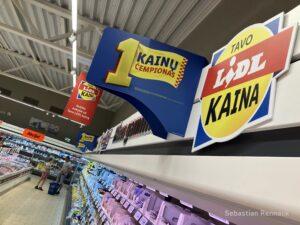Lidl fights to regain price leadership in Lithuania
Lidl is struggling to regain momentum in Lithuania. Last year, the Schwarz discounter posted the lowest revenue growth among the country’s top food retailers. The abolition of paper leaflets in spring 2023 might have been instrumental in the drop in customers’ favor. Domestic competitors Maxima and Norfa are competing successfully with Lidl’s discount supermarket concept.

Lidl’s ‘Kainų Ćempionas’ (price leadership) campaign currently dominates in-store communication
Lithuania’s Lidl has announced its financial results for the year ended February 2024. According to the company, net sales increased by 6.3% to 871 million euros in the period under review, while net profit fell from 46.6 million euros to 16.3 million euros, resulting in a net profit margin of 1.8%, down from 5.7%. In the previous financial year, Lidl Lithuania still ranked among the top earners of Lidl’s Central and Southeast European operations in terms of margin, after the Czech Republic (6.1%) and Slovakia (8.4%). The company cites the installation of the second logistics centre in the country, which only opened in May this year, double-digit wage increases since 2022 and price investments as major cost factors. Not only did profitability fall, but sales were also at the lower end of the top retailers. Market leader Maxima Grupe increased net sales by 7.9%, Iki (Germany’s Rewe Group) by 8.3% and fourth-placed domestic retailer Norfa by 15.4%.
In an interview for this article, Petras Cepkauskas, Head of the Food Division at Lithuanian market research company Pricer.lt, estimates that Lidl’s market share in food retail fell from 13.0% to 12.7% in the last financial year. Cepkauskas cites several possible reasons for the decline:
For one, Lidl had abandoned paper leaflets from May 2023, which were reintroduced later in the year, but in a reduced version. According to Cepkauskas, large parts of the the international ‘Flavours of the World’ range and much of the high-margin non-food range remained online only. This may have had an impact on Lidl, resulting in lower footfall, lower sales and a less favourable margin mix.
The decision may have been taken with the aim to drive customers to Lidl’s digital-only rewards app, Lidl Plus. However, Cepkauskas says that using the in-app coupons to create the image of a price leader may not match the reality of customers’ price perceptions. This is because in-app prices are not communicated in the same way as offline discounts. As a result, he sees Lidl falling back into the role of price follower behind market leader Maxima in the second half of 2023.
Also steering customers towards self-service checkouts may not have been in line with customer preferences. In September last year, Lidl announced that it had equipped all its stores with self-service checkouts. In addition, the retailer said that special XXL checkouts with larger scales have been installed in more than a third of its stores to allow larger purchases to be scanned.
On the other hand, Cepkauskas sees the competition successfully countering Lidl’s discount supermarket concept. Market leader Maxima has fine-tuned its promotions, launched a new mid-price private label called ‘WellDone’ and has become more aggressive on prices. For domestic operator Norfa, number four in the national ranking, its low-cost and everyday low price (EDLP) strategy is paying off. Norfa’s vertical integration into production – meat factories, fruit and vegetable canneries, milk processing plants and a central bakery – allows the retailer to keep standard shelf prices low.
Lidl is fighting to regain the image of price leader in Lithuanian food retail. According to market research conducted on behalf of the Schwarz discounter, Lidl has been the cheapest of the top five Lithuanian food retailers for nine months in a row, based on a pre-defined basket of 23 food products. Lidl’s ‘Kainų Ćempionas’ (price leadership) campaign currently dominates in-store communication. Pricer.lt’s monthly comparison of a basket of several dozen basic food items shows, however, that Lidl in the past twelve months on average managed only second place after market and price leader Maxima.
Related news
Lidl Magyarország wins Top Employer award once again
🎧 Hallgasd a cikket: Lejátszás Szünet Folytatás Leállítás Nyelv: Auto…
Read more >Lidl is building a new administrative and logistics centre in Straubing
🎧 Hallgasd a cikket: Lejátszás Szünet Folytatás Leállítás Nyelv: Auto…
Read more >From the shopfloor: What the Mere format reveals about retail concentration
🎧 Hallgasd a cikket: Lejátszás Szünet Folytatás Leállítás Nyelv: Auto…
Read more >Related news
Farewell day at the 60th anniversary EuroShop trade fair
🎧 Hallgasd a cikket: Lejátszás Szünet Folytatás Leállítás Nyelv: Auto…
Read more >NAV: Women’s Day inspections begin
🎧 Hallgasd a cikket: Lejátszás Szünet Folytatás Leállítás Nyelv: Auto…
Read more >








